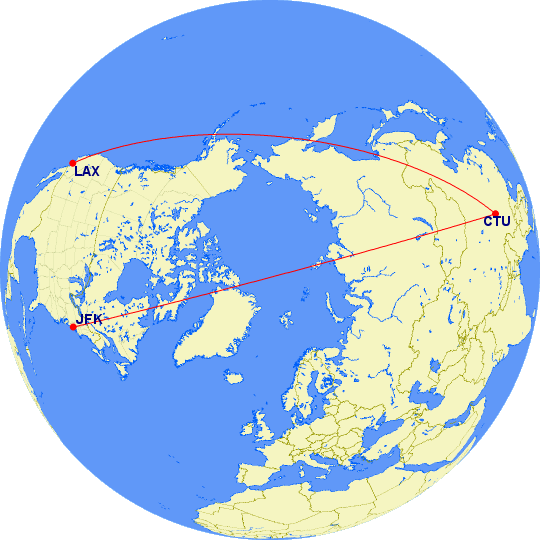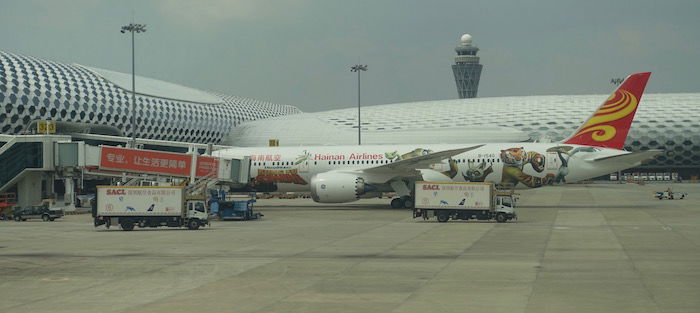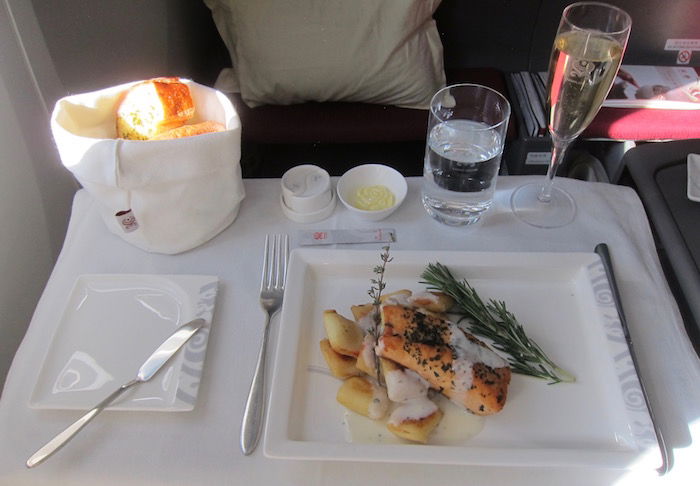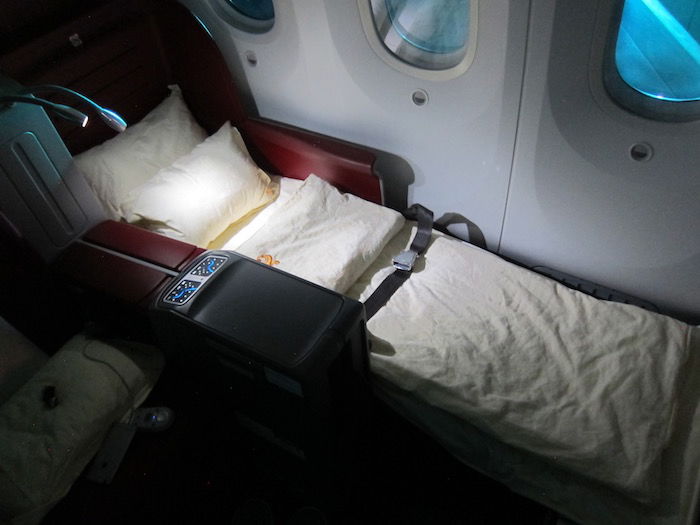China’s aviation policies are bizarre to me. The country has a rule where only one Chinese airline can operate any individual longhaul route. Given the pace at which Chinese airlines are growing, this is causing many of them to scramble in order to launch routes before their competitors do.
For example, Hainan Airlines is based in Beijing, but earlier this year they launched flights between Los Angeles and Changsha. That’s because Air China already operates a flight from Los Angeles to Beijing, so Hainan can’t replicate it. So instead Hainan’s U.S. destinations out of Beijing include cities like Boston, Las Vegas, San Jose, and Seattle, since Air China doesn’t fly to those cities.
Well, Hainan Airlines has just requested a couple of new U.S. routes from the Department of Transportation, and they have a pretty hilarious strategy here.
Hainan Airlines wants to fly from Chengdu to New York & Los Angeles
Hainan has just filed with the Department of Transportation to request permission to add routes from Chengdu. Per a filing with the DOT:
Hainan Airlines Co., Ltd., an air carrier of the People’s Republic of China, respectfully requests that the Department amend Hainan Airlines’ foreign air carrier permit to enable it to engage in scheduled foreign air transportation of persons, property and mail between Chengdu, People’s Republic of China and New York, New York (JFK) and between Chengdu and Los Angeles.
Hainan intends to operate scheduled flights to both US cities using Boeing 787 aircraft with a two class configuration. Hainan proposes to operate the Los Angeles route initially with two flights per week beginning in the first quarter of 2017, and the New York route initially with three flights per week beginning in the second quarter of 2017.
As you can see, Hainan wants to:
- Fly from Chengdu to Los Angeles 2x weekly starting in the first quarter of 2017
- Fly from Chengdu to New York 3x weekly starting in the second quarter of 2017

Why Hainan is requesting Chengdu flights
So, why is Hainan suddenly requesting rights to fly from Chengdu to Los Angeles and New York, even though Hainan doesn’t have any other longhaul flights out of the airport? For a simple reason — because their competitor, Sichuan Airlines, has just started flying from Chengdu to Los Angeles.
However, Sichuan operates the flight via Hangzhou, since they don’t have a plane that can operate the flight nonstop. Sichuan has even added an additional frequency via Jinan. However, Sichuan Airlines will soon be taking delivery of an A350, which they intended to use to operate the route nonstop.
But assuming this route for Hainan gets approved, Sichuan won’t be allowed to fly it, since Hainan beat them to the punch, simply because they had the right plane at the right time. Sucks big time for Sichuan!

Hainan’s 787 are making this route possible
Why I’m excited about Hainan’s expansion
I flew Hainan Airlines earlier in the year from Los Angeles to Changsha and back, and had a fantastic experience. While I don’t love their hard product, the service and food were fantastic. Hainan is ranked as China’s only Skytrax 5-star airline, and in terms of the soft product they deserve it.

Hainan’s business class meal service
But that’s not the only reason I’m excited:
- Hainan generally publishes excellent business class fares, and they’re a partner with Alaska Mileage Plan, which is a great program with which to rack up miles
- Hainan is good about making award space available, so you can redeem Alaska miles for their flights

Hainan 787 business class bed
Bottom line
China’s aviation policies seem a bit self destructive to me. Many of the airlines are government owned, and they’re having to irrationally compete with one another. Rather than letting them compete directly on routes, they’re making them all have inefficient route networks that don’t maximize connection opportunities.
I realize this is perhaps intended to encourage service to secondary cities, and that’s fine. But long term this just doesn’t seem like a smart policy.
Regardless, well played, Hainan, well played. I imagine the leadership at Sichuan is not happy right now…




Dear Ben, I've corrected you before but I'd like to correct you once more here, you made a mistake about China's aviation policies. It's not "The country has a rule where only one Chinese airline can operate any individual longhaul route." The accurate description should be "The country has a rule where only one Chinese airline can operate any individual China-USA route."
Take MU219 and CA935 for example, both flights are direct, between Shanghai Pudong...
Dear Ben, I've corrected you before but I'd like to correct you once more here, you made a mistake about China's aviation policies. It's not "The country has a rule where only one Chinese airline can operate any individual longhaul route." The accurate description should be "The country has a rule where only one Chinese airline can operate any individual China-USA route."
Take MU219 and CA935 for example, both flights are direct, between Shanghai Pudong and Frankfurt, one is operated by China Eastern, the other one is operated by Air China.
Please stop mistaking, thanks~
@Simon
Congrats for writing an essay to shift the topic far, far away from that of a travel blog. You win.
*Clap clap clap*
Chengdu is also a major Air China hub, although CA wasn't in the market for US routes ex-CTU at this time. However they do have European service from there (FRA, CDG) and so they may want to launch a couple more to protect their hub, from both Hainan and Sichuan.
Also, although you're mostly right that Hainan's services ex-PEK are to secondary US cities, they did manage to nab PEK-ORD from under Air China's nose.
@Andy,
Yeah, could argue those 'positives' of state-directed/state-controlled. Point was manipulations to economic and societal invisible hand, causes unintended results.
Logical decision, for those with power, isn't really being prevented in any of those cases. One carrier, one route is residual of decentralization during one of the more free-market periods, assigning broken up pieces to the administrative regions, then trying to partially reverse it later. Guessing heads of each of those SOE airlines weren't keen...
@Andy,
Yeah, could argue those 'positives' of state-directed/state-controlled. Point was manipulations to economic and societal invisible hand, causes unintended results.
Logical decision, for those with power, isn't really being prevented in any of those cases. One carrier, one route is residual of decentralization during one of the more free-market periods, assigning broken up pieces to the administrative regions, then trying to partially reverse it later. Guessing heads of each of those SOE airlines weren't keen to give up power.
-Extensive rail system when you "acquire" the IP from someone else, saving the R&D of internally developing it, then award contracts to the SOE saving all that IRR and profitability type nonsense. Not illogical to favor the firm domestic firm over the foreign firm in the IP dispute. Kickbacks were working out great for the Railroad Minister until he was signaled out as the fall guy after the cover-up of the collision didn't work out.
-Not illogical to attempt to prop up domestic firms over competing with foreign firms via lower worker cost, lack of environmental consideration, and currency-devaluation. Worked until others imposed import tariffs to counterbalance the artificial lower costs of the exports to undercut competition. Beijing becoming almost naturally uninhabitable has certainly put a damper on it as well.
-New infrastructure is often easier to begin with, then add less worker rights, disregard of property rights. Ghost cities, officials-endorsed contractors running off with investor money, officials being chased out of town after trying to convince farmers to sell their land for pennies on the dollar in exchange for a kickbacks. Construction companies debt levels on their balance mean they cannot be allowed to fail.
Sounds sustainable with the massive monetary and intellectual capital flight accelerated by depreciating Yuan. At the moment a good chunk, when they can, are choosing to leave that brilliant low-end commodity producing, new infrastructure company. Voting with their feet and their wallets.
More-efficient than back-door lobbying, pork-barrel, vote bartering, pro quid quo of Western systems? Yes. Sometimes sound better than trying to build a new airport or rail-link without having to get approval from every Tom, Dick, and Harry at each level of government, and build it without having to guarantee X% of contracts sourced to union-labor and at market cost of capital? Sure. But doesn't sound so good if you have minimal workers rights, reduced freedom of movement, company success as much about connections as operation, etc.
I was wondering how much is the fair ticket first class on Hainan airline ? I usually travel to Beijing and I want to try Hainan ? Thank you josh
@Simon
Also brought to you by the country with:
- By far the most extensive high-speed rail system.
- By far the biggest producer of steel and cement.
- More and more cities with fast-expanding subway systems
- among others
Just saying.
And so are democracy and efficiency
Communism and efficiency are not words that go together
Why is that this policy has been approved! I thought they are business minded people? This should not be the ruling since China is a huge country and are many of them flew to any points if the world. Ohmygee!
China aviation policies: brought to you from the same country (evolved ideology) that brought you Cultural Revolution, One-child policy, & the National Civil Service Exam rat race for kids to secure positions with good benefits (read: influence). Communist/State-directed-Capitalism creates illogical decisions relative when the logical options is barred.